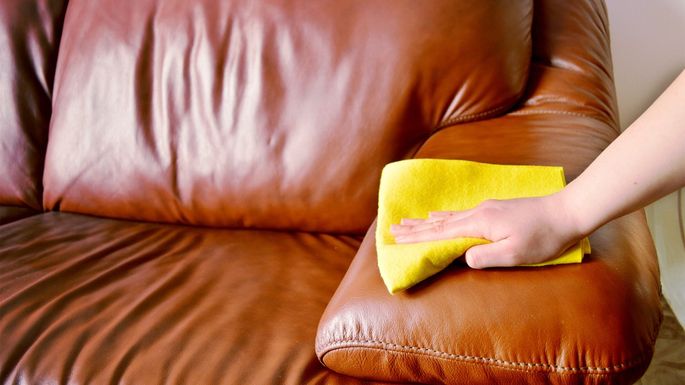Water is not always the best cleaner
February 14, 2020 We use water for everything—to drink, shower, cook, do the dishes, wash the car, and more. Building block of life, right? (Actually, that’s carbon, but let’s just go with it.) So naturally you’d think water could be used to clean all kinds of things. But you’d better think again.
We use water for everything—to drink, shower, cook, do the dishes, wash the car, and more. Building block of life, right? (Actually, that’s carbon, but let’s just go with it.) So naturally you’d think water could be used to clean all kinds of things. But you’d better think again.
“Although water is the perfect cleaning agent, it should not be used by itself for quite a number of household items and areas,” says Angela Chow, operations manager for AspenClean in Toronto. “It’s always a good idea to wipe surfaces dry or vacuum first, regardless of the type of cleaner you use.”
Before reaching for the H2O, be aware of these items that don’t play well with water.
1.Wood furniture and hardwood floors
The wood surfaces in your home are durable, but there’s definitely a right way—and a very wrong way—to care for them.
“Water and wood simply don’t mix,” says Heather Lindemann, senior communications manager for Colorado-based Bona, an industry leader in hardwood floor care. “Any amount of water left to sit on a hardwood floor can warp or damage the wood or even degrade the polyurethane finish. A mop and bucket will always leave more water on a hardwood floor than is ideal.”
And, DIY solutions like water and vinegar can damage the floor finish, Lindemann says. She recommends instead using a mop with a microfiber pad that can deliver the right amount of cleaning solution on the floor.
“Look for hardwood floor cleaning solutions that are specifically formulated for the surface, are pH-neutral, and residue-free,” says Lindemann.
2. Brick, marble, and stucco
Because of the porous nature of brick, marble, and stucco, water can cause damage to these surfaces and ruin any protectant sealants on them.
“Brick walls should not be cleaned with water. Water can, in some cases, cause mold to appear on the brick,” says Chow.
Experts suggest using a brush with soft bristles to get any dust particles off the surface while avoiding damaging the surface. And be sure to wipe it down with a soft cloth or vacuum, and to clean more often.
3. Brass and silver
Keep brass bright and Grandma’s silverware in top condition by skipping water altogether.
“Brass fixtures should not be cleaned with water. Actually, brass doorknobs disinfect themselves in eight hours,” says Dawna Boone, owner of Valet Maids in Dallas. “The best way to clean these fixtures is with vinegar. When soaking fixtures such as brass shower heads, never soak them for more than 30 minutes.”
Chow says water can tarnish silver and ruin the finish, which acts as a protective layer. Water can also leave items streaky.
“This applies to jewelry as well as appliances, such as fridges, microwaves, toaster ovens, and many other items in the home,” says Chow. “It’s best to use cleaning products intended for that type of surface. Wipe them dry with a microfiber cloth for a streak-free finish.”
4. Leather, velvet, velour, and suede
It may have taken forever to find that perfect tan leather couch to match your decor. So keep it looking brand-new with special care. Using water to clean furniture made of leather, velvet, velour, and suede is never a good idea.
“Be gentle when cleaning leather furniture. Don’t use wet cloths, harsh cleaning products, or ammonia-based products,” says Boone. “Don’t clean your leather furniture with water alone.”
She says the best way to clean leather furniture is to make a mixture of vinegar and water, or leather cleaner and water, and to make sure that the cloth used is damp and not completely soaked.
“Cleaning your leather furniture this way will make it last and look newer longer,” Boone says.
5. Electronics
You spent a lot of money on items like a flat-screen TV and video gaming console, so you want to make sure they last. Like other items in your home, make sure they get a thorough cleaning—just don’t use water.
“Electronics should only be cleaned with cleaners designed for electronics,” says Boone. “Using water on electronics can permanently damage them and, in the case of electronics with screens, can leave streaks.”
Stubborn stains can be taken care of with a very small amount of dish soap to break up the grime. But it’s always best to check the owner’s manual before attempting to clean the item.
6. Light fixtures and outlets
This one may seem like a no-brainer. But people sometimes forget that even light fixtures plugged into an outlet don’t mix with water. When they cross, they can lead to electrocution and fire. Light fixtures should always be unplugged before cleaning.
“Make sure they have cooled off before touching them,” says Chow. “Use a dry cloth or duster to remove accumulated dust first.”